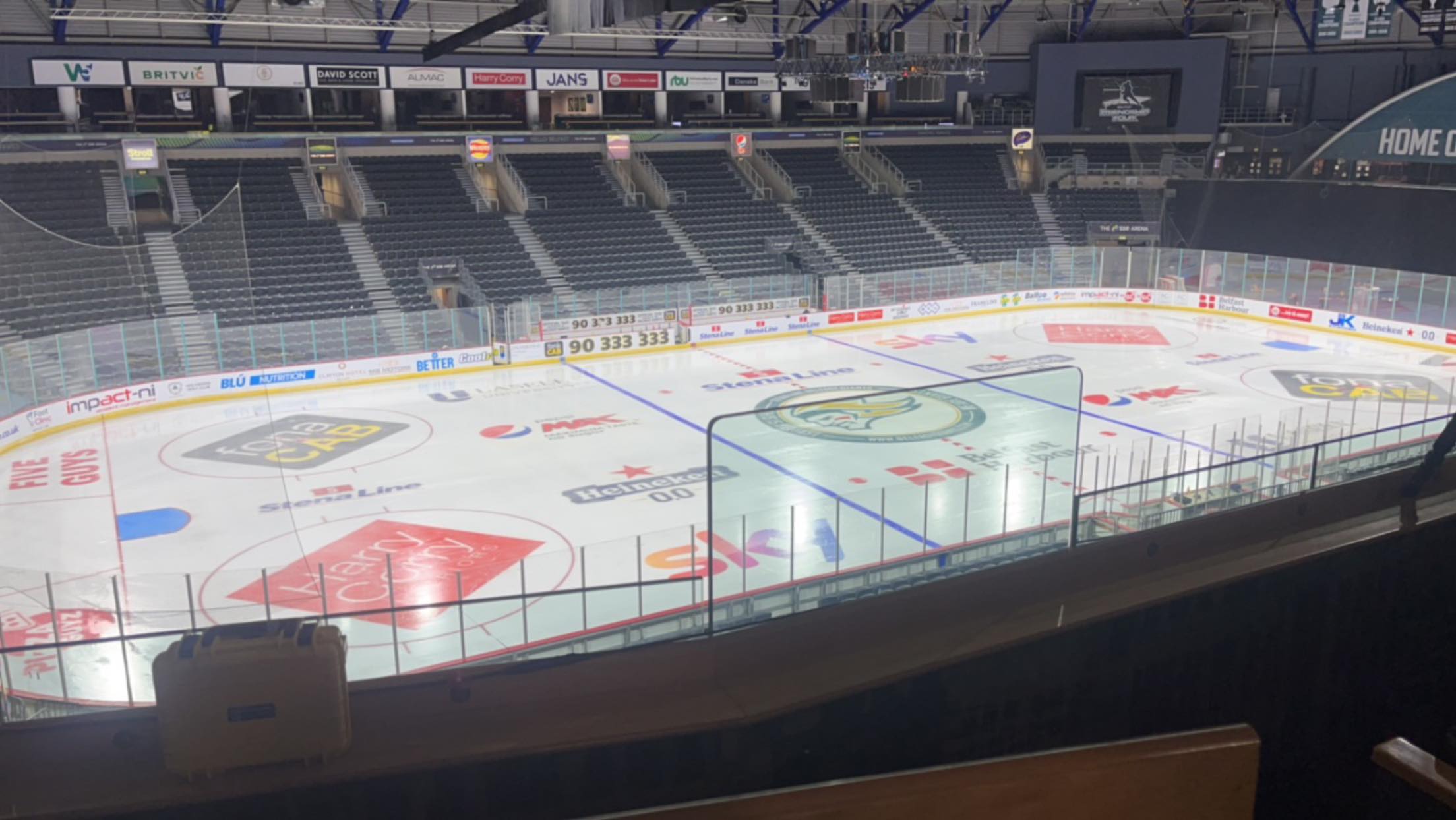Intro
Work placements within both school and university have become a staple of the education experience. As described by Inceoglu, Ilke et al, (2019) “transitions from higher education to employment have long been of scholarly and practical interest, and work placements are crucial transition experiences that can help career adaptation and development of career resources”. It is therefore extremely important to ensure you obtain a worthwhile placement in order to maximise the useful work experience you are able to gain from such a role.
In this blog I will be utilising Gibbs’ reflective cycle (1988) to reflect on and analyse my experience so far in my work placement with Infinity21 and the Belfast Giants. Gibbs’ reflective cycle, as summarised by Jasper (2003) encourages not only a clear description, but also critical analysis of a situation, and encourages projective thoughts on what one would do should the situation happen again.
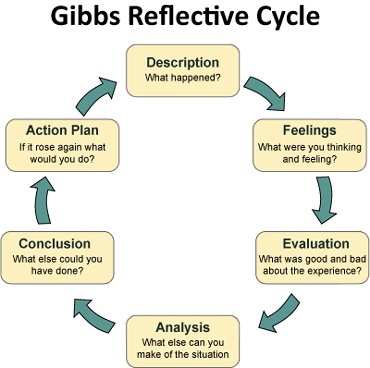
I will therefore not only be describing the events which have transpired in my placement, but I will reflect on them and analyse what I could’ve done better.
Description – what has happened so far?
For my work placement I have the pleasurable opportunity to work with Infinity21, a media company which handles many aspects of the broadcast production in the Belfast Giants’ ice hockey matches. My work takes place at the home games, which are held at the SSE Arena in Belfast. I got the opportunity by contacting David Lowry, owner of Infinity21, via email. I spoke with him, and although he had already granted opportunities to two fellow classmates of mine, he was very interested in my passion for sports journalism, and more specifically my keen interest in presenting and interviewing, rather than just ‘behind the scenes’ roles.
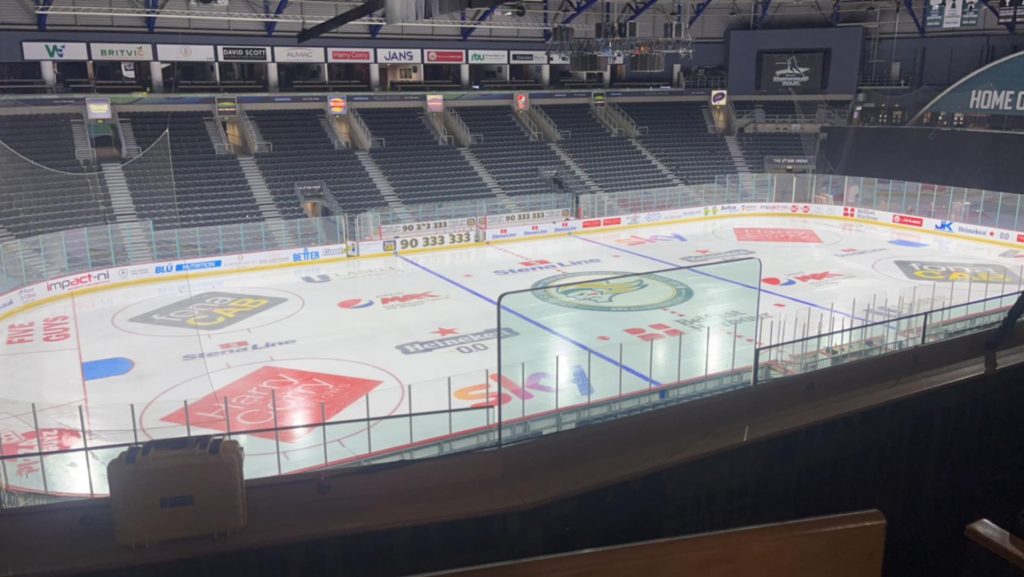
Infinity21 are responsible for most of the broadcast production at the matches, including elements such as camera operation (both game cameras and crowd cameras), sounds such as announcements and music, and effects like the scoreboard and action replays. These are all areas which are of course extremely interesting for me to get experience with, as someone who has aspirations of being involved in sports media production.
Unfortunately, I have not yet been able to be involved in very much practical work. David explained to me that the first few months of a new hockey season are always extremely busy and high-pressured, and therefore it was better for me to take a backseat and instead simply observe the work of others so far. It is because of this that I have been able to observe all of the elements of the production at the games. This has been a great opportunity in itself, as it has granted me a great education in certain roles which I wasn’t too familiar with before, such as camera work and vision mixing. As well as observing some great camera work, lighting work, music management and vision mixing, I have of course done the standard ‘starter work’ such as carrying equipment bags and packing away equipment at the end of the night. Such basic work also gives me important experience in what it is like to be ‘the new guy’ at an establishment, and so it is also important in its own way.
Feelings – how have I been thinking and feeling about my experiences?
In general, I have had mixed feelings about my experience so far. At the start I was absolutely over the moon that I had been given this massive work experience opportunity. When I arrived on the first day and David handed me my own personal Ice Level pass, as pictured below, I was extremely happy and very excited for the near future. The fact that we are sat up high in one of the fancy suites at the games gives me the feeling that I am important, and seeing the goings on behind the scenes of a sports game as a sports fan myself is highly interesting and a very unique experience.
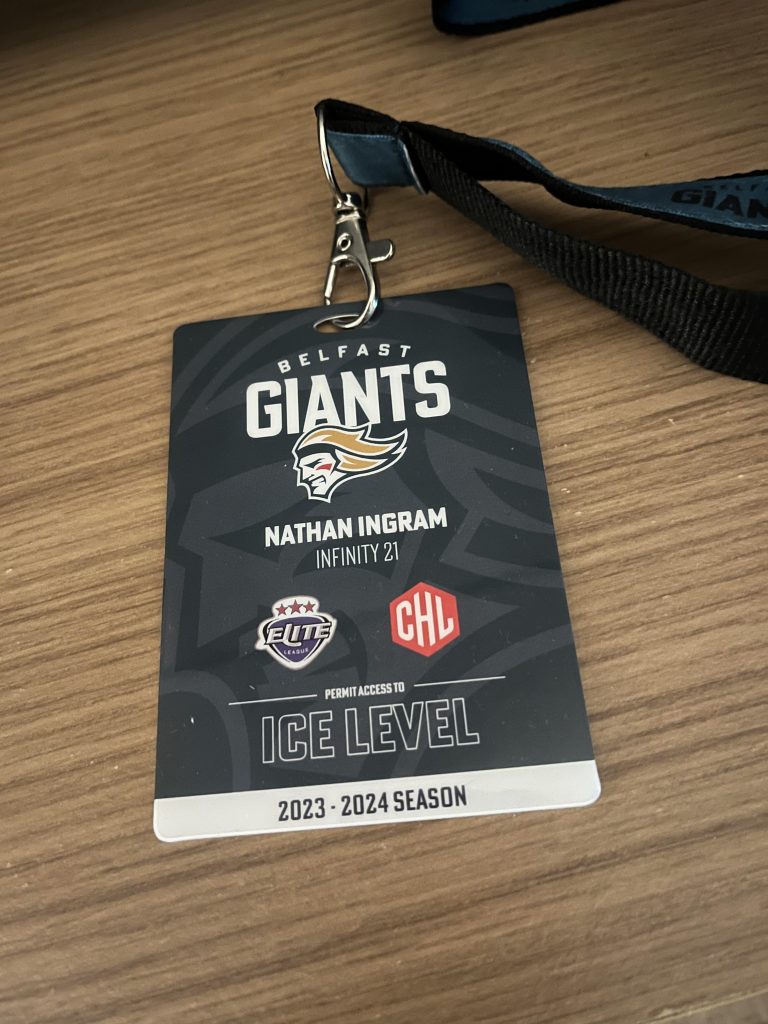
However, as aforementioned, I haven’t been able to undertake many real production work so far in my placement. This is of course frustrating as I want to gather as much experience as possible in this role, and I am hearing from a lot of others about the cool and interesting experience they have been gathering at their placements. This reminds me of the writings of Davies and Bansel (2005) who describe how students are affected by the neoliberal imperative to maximise time. They explain how students feel guilty when they aren’t able to ‘maximise their time’. This makes students feel like they must take every opportunity to work and build their portfolios, making sure not to waste any time. At times during the experience so far, I have been anxious in this way, wondering if I could’ve been more assertive, offering myself more for certain roles and tasks.
At the end of the day though, thankfully David has remained upbeat and has reassured me on multiple occasions that I will be given much more tasks in the coming months now that the busy period at the start of the season is over. He remains optimistic and the fact that he was also interested initially in my passion for presenting and interviewing leaves a lingering feeling of optimism with me as well. When I have been feeling anxious or frustrated, his words of encouragement have left me feeling positive and expecting a lot more practical work to come in the near future.
Evaluation – what has been good and bad?
As stated by Gibbs in 1988, “it is not sufficient simply to have an experience in order to learn. Without reflecting upon this experience, it may quickly be forgotten, or its learning potential lost”. It is therefore imperative not only for me to describe what has happened and how I feel about it, but also to take a more objective approach to evaluating the goings on.
As aforementioned, for a while in my placement I had been feeling down and frustrated. This was due to a lack of opportunity so far to complete practical work. At the time I had thought I was failing in my placement, and that maybe it was going to continue this way and I would finish it without gaining any practical experience.
However, taking a more objective and less emotional approach retrospectively, I was being a bit too impatient, perhaps. Look, I believe I was right to be frustrated in not being able to complete many practical tasks, but this frustration I now feel had blinded me from the other experiences I was gathering. As Inceoglu, Ilke et al (2019) excellently point out, placements are also opportunities for enhancing a person’s social capital resources by meeting and interacting with new and different people. They also provide a diagram (which I have included below) showing how social identities evolve as we gain better social capital by widening our networks in placement.
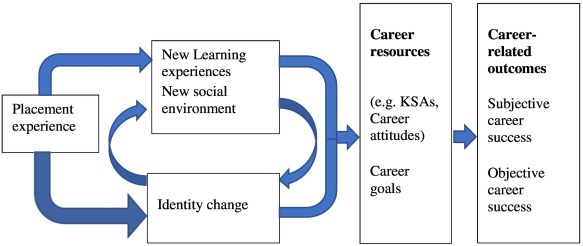
I feel that these social skills have been developing very well in the background while I have been watching others work and asking questions to broaden my understanding of areas I haven’t been familiar with before.
Finally, objectively, David’s assurance that I will be working practically in the near future, and the fact that he has been adamant to reassure me as such, shows that he hasn’t simply ignored me, and that I do definitely fit into his future plans.
Analysis – what else can I make of the situation analytically?
I feel that the most obvious theoretical tie-in with my situation is the previously mentioned work by Davies and Bansel (2005). Their work describing the neoliberal need to maximise the use of time is really visible in this situation. It is clear that I am simply an over-excited student who was hyped up at being given such a massive opportunity, to work with a sports media company when my end goal is extremely similar to this, is a blessing that a lot of people would be very grateful to be given. It is clear that my over-excitement has led me almost to impatience, and I need to be more grateful of the social and observatory experience I am gaining, not getting too caught up rushing for practical work. It will come with time as David has said, and I need to stop worrying about maximising my time so much and concentrate on the opportunity in front of me.
Schlossberg describes transitions as changes in assumptions about the world, the self, behaviours, and relationships, and relative to placements, can apply to new doors of interest and opportunity opening up for students with new experiences they go through in placement. The experiences I have gained so far have made me realise these things about myself and the world, that one needs to remain patient for opportunities rather than rushing, and for that I need to be grateful.
Conclusion/Action plan – what next?
I will remain optimistic in my pursuit of experience, waiting for my opportunity to shine with some practical work. When my opportunity arises, I will be sure to be upbeat and happy to undertake the role, showing my appreciation for David’s help.
I will continue to offer myself to help in any possible way, but making sure not to be too persistent, as I would hate to put David under more pressure than he is already under when controlling the production team.
My positive mindset, coupled with my hunger for experience will be crucial in wrapping up this placement in an adequate manner, leaving the role with great and useful new experience in my target sector of sports broadcasting.
References
Davies, Bronwyn, and Peter Bansel. “The time of their lives? Academic workers in neoliberal time (s).” Health Sociology Review 14.1 (2005)
Gibbs, G. (1988) Learning by Doing: A Guide to Teaching and Learning Methods. Oxford: Oxford Further Education Unit.
Inceoglu, Ilke, et al. “(How) Do work placements work? Scrutinizing the quantitative evidence for a theory-driven future research agenda.” Journal of Vocational Behavior 110 (2019)
Jasper, Melanie. Beginning reflective practice. Nelson Thornes, 2003.
Main, Paul. “Gibbs’ Reflective Cycle”. Structural Learning, https://www.structural-learning.com/post/gibbs-reflective-cycle. Accessed 16 November 2023.
Schlossberg, Nancy K. “A model for analysing human adaptation to transition.” The counselling psychologist 9.2 (1981)
